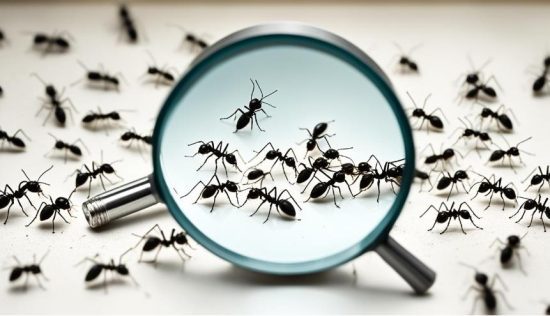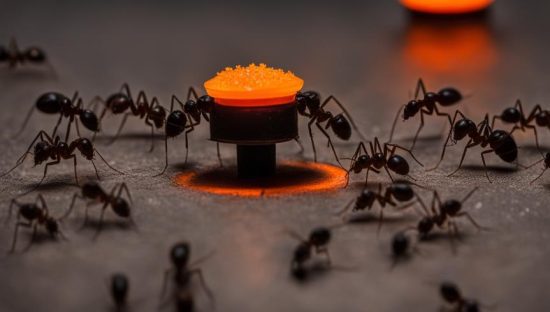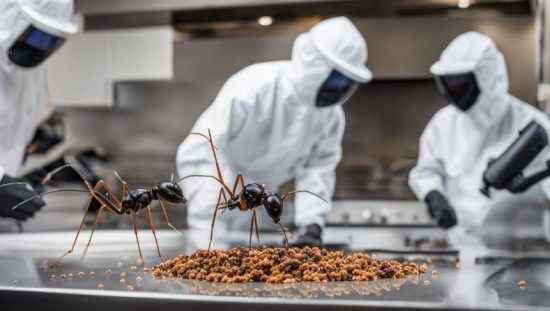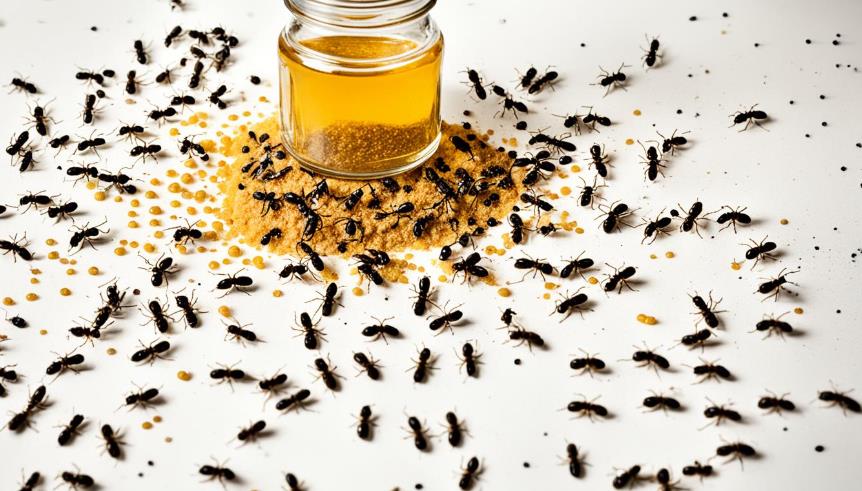Are tiny black ants invading your kitchen, making it nearly impossible to enjoy a meal without their unwelcome presence? You’re not alone. These pesky creatures can quickly become a nuisance, crawling around your countertops, kitchen cabinets, raiding your pantry, and leaving trails of tiny black dots everywhere they go. But fear not, because we have a question for you: Did you know that there are 7 easy methods to eliminate these tiny black ants from your kitchen once and for all?
If you’ve been struggling to find an effective solution, look no further. In this article, we will guide you through practical steps and proven techniques for how to get rid of tiny black ants in kitchen. From natural and homemade solutions to understanding ant behavior, commercial ant traps, long-term strategies, and pet-safe methods, we’ve got you covered.
So, are you ready to take control of your kitchen and bid farewell to those tiny black intruders? Let’s dive into the 7 easy methods that will help you reclaim your space and ensure a black-ant-free environment in your kitchen.
The Persistent Problem of Tiny Black Ants in Kitchens

When it comes to dealing with tiny black ants in kitchens, it’s important to understand the persistent nature of these pests and their behavior. These tiny black ants, scientifically known as Monomorium minimum, are commonly found invading kitchens in search of food and water sources. Their small size allows them to easily access even the tiniest cracks and crevices in your kitchen.
Ants are social insects that live in colonies, and the colonies can contain thousands of individual ants. They establish their nests in various locations, such as underneath sinks, behind baseboards, or even in walls. From these nests, worker ants venture out in search of food, leaving pheromone trails to guide other ants to the food sources they discover.
How to Get Rid of Tiny Black Ants in Kitchen – Targeting the Source
One of the most effective ways to eliminate a tiny black ant infestation in your kitchen is to target the source. By identifying and eliminating ant entry points, you can prevent these pesky insects from entering your kitchen in the first place, reducing the overall infestation.
To begin targeting the source of the ant infestation, start by inspecting your kitchen thoroughly for any potential entry points. Look for cracks, gaps, and crevices in walls, floors, and countertops that could serve as entryways for ants. Common entry points include gaps around pipes, windows, and doors.
Once you’ve identified the entry points, take proactive measures to seal them. Use silicone caulk or weather stripping to seal gaps around windows and doors. Fill in cracks and crevices with caulk to prevent ants from squeezing through. For larger openings, consider using expanding foam sealant or mesh screens to block access.
1. Natural and Homemade Solutions for Ant Control
Essential oils such as peppermint, lemon, and tea tree oil are known for their strong scents that ants find repulsive. To create a homemade ant repellent, simply mix a few drops of your preferred essential oil with water in a spray bottle and spray it around potential entry points and areas where ants are commonly seen. The powerful aroma of essential oils acts as a deterrent, keeping ants at bay.
In addition to essential oils, there are other natural ingredients that can help repel ants. For example, a mixture of vinegar and water can be sprayed directly on ants or their trails to disrupt their pheromone communication and discourage them from returning. Another homemade solution is a mixture of water and dish soap, which can be used to create barriers around ant entry points, making it difficult for them to enter your kitchen.
2. Understanding Pheromone Trails and Ant Behavior
In order to effectively control and eliminate ant infestations in your kitchen, it’s important to have a deeper understanding of pheromone trails and ant behavior. Ants rely on pheromones, chemical signals that they leave behind, to communicate with each other and establish trails to food sources.
When an ant finds a food source, it leaves a trail of pheromones behind as it returns to the colony, signaling to other ants that there is food nearby. This communication system allows ants to efficiently locate and exploit food sources, but it also allows the infestation to spread rapidly within your kitchen.
In order to disrupt ant communication and prevent further infestation, it is essential to break the pheromone trails. One effective strategy is to thoroughly clean the areas where ants have been spotted with a solution of vinegar and water. This helps to remove the pheromone trails, making it more difficult for ants to follow them.
Additionally, sealing off potential entry points for ants can help prevent them from entering your kitchen and establishing new trails. This includes sealing cracks, gaps, and crevices in walls, floors, and windows. By disrupting their ability to communicate and establishing new trails, you can effectively deter ants from infesting your kitchen.
3. Commercial Ant Traps and Baits: When to Use Them

When it comes to tackling an ant infestation in your kitchen, commercial ant traps and baits can be highly effective. These products are specifically designed to attract ants and eliminate them at the source. Commercial ant traps and baits work by luring ants with enticing food scents, enticing them to enter the trap or bait station, where they will consume the toxic substance and carry it back to their colony.
One of the key advantages of using commercial ant traps and baits is their convenience. They are readily available in local stores and online, making them easily accessible whenever you need them. These products are designed to be user-friendly, typically coming in pre-packaged and easy-to-use formats.
So, when should you consider using commercial ant traps and baits? There are a few scenarios where they can be particularly useful:
- When you have identified ant entry points: If you have identified the entry points where ants are gaining access to your kitchen, strategically placing ant traps or baits near these points can intercept the ants and prevent them from further infesting your space.
- When you are dealing with a large ant colony: If you have noticed a significant number of ants in your kitchen, it is likely that there is an established colony nearby. Using commercial ant traps and baits can effectively target and eliminate the entire colony, as ants will bring the bait back to their nest to feed the rest of the colony, ensuring comprehensive elimination.
- When you have tried other methods without success: If you have already tried natural or DIY methods without success, it may be time to turn to commercial ant traps and baits. These products are formulated with potent insecticides that can effectively exterminate ants, even in severe infestations.
4. Why Professional Pest Control May Be Necessary
Pest infestations can be a frustrating and challenging problem to tackle, especially when it comes to tiny black ants in your kitchen. While DIY methods can often provide temporary relief, there are limitations to their effectiveness. In certain situations, professional pest control becomes necessary to fully eradicate the infestation and prevent future recurrence.
One of the key limitations of DIY methods is that they often only address the surface level of the problem. These methods may eliminate a few ants here and there, but they may not target the root cause or the entire colony. This can lead to the infestation persisting or recurring over time.
Professional pest control, on the other hand, offers a more comprehensive approach. Pest control experts are trained to identify the source of the infestation and develop effective strategies to eradicate the ants. They have access to powerful insecticides and tools that are not readily available to the average homeowner.
5. Ant-Proofing Your Kitchen: Long-Term Strategies
One effective long-term strategy for ant-proofing your kitchen is to keep it clean and free from food debris. Ants are attracted to food sources, so regularly wipe down countertops, sweep floors, and clean up crumbs and spills. Store food in airtight containers to prevent ants from accessing it.
Another important step is to seal any potential entry points that ants may use to access your kitchen. Check windows, doors, and cracks in the walls for gaps or openings and use caulk or weatherstripping to seal them. This will create a physical barrier that prevents ants from entering your kitchen.
6. Utilizing Aromatic Deterrents to Combat Ants

Another effective method to combat ants in your kitchen is to utilize aromatic deterrents that repel ants with smells they dislike. Ants have a keen sense of smell, and certain scents can act as natural repellents, discouraging them from entering your kitchen.
One popular aromatic deterrent is the use of essential oils. Ants are known to dislike strong-smelling oils such as peppermint, tea tree, and citrus. To use essential oils, mix a few drops with water in a spray bottle and apply the solution along ant trails, entry points, and areas prone to ants. The strong aroma will make the kitchen less appealing to ants, deterring them from entering.
Another aromatic deterrent you can try is using herbs and spices. Ants are repelled by strong smells from kitchen staples like cinnamon, cloves, and garlic. Sprinkle these herbs and spices in areas where you’ve seen ant activity, such as near countertops, cabinets, or garbage bins. The strong scent will discourage ants from foraging in your kitchen.
7. Pet-Safe Methods for Controlling Ants in the Kitchen
If you have pets at home, it’s essential to take pet-safe measures when dealing with ant infestations in your kitchen. Here are some effective methods that will help you eliminate ants without putting your furry friends at risk.
1. Pet-Safe Ant Repellents: You can create your own pet-safe ant repellent using natural ingredients like vinegar, lemon juice, or peppermint oil. These substances are highly effective in deterring ants while being safe for pets.
2. Ant Bait Stations: Pet-safe ant bait stations are available in the market, specifically designed to attract ants without posing any harm to your pets. These bait stations contain ant bait that ants take back to their colony, eliminating the entire colony over time.
3. Seal Off Entry Points: By identifying and sealing off ant entry points, you can prevent ants from entering your kitchen while ensuring the safety of your pets. Use pet-safe sealants or caulking to close any gaps or cracks where ants may be gaining access.
4. Natural Repellent Barriers: Create natural repellent barriers around your kitchen to keep ants away from your pet’s food and water bowls. Sprinkle a line of pet-safe substances like cinnamon, coffee grounds, or diatomaceous earth, which ants dislike, to deter them from entering the area.
5. Maintain Cleanliness: Regularly clean your kitchen to eliminate food crumbs and spills, which attract ants. Pet-safe cleaning products should be used to ensure that no harmful chemicals are present on surfaces that your pets may come into contact with.
Knowing When It’s Time to Call the Experts
If you’ve tried various methods to get rid of the tiny black ants in your kitchen without success, it’s important to recognize when it’s time to call in the experts. Sometimes, an ant infestation can become unmanageable, and professional pest control assistance is necessary to effectively eliminate the problem.
One sign that your ant infestation may be beyond your control is if you notice multiple ant colonies in different areas of your kitchen. This indicates that the infestation has spread and requires a more comprehensive approach. Additionally, if you’ve tried DIY methods and the ants keep returning, it’s a clear indication that professional intervention is needed to address the root cause of the infestation.
Another warning sign is if you’ve identified potential entry points and taken preventive measures, yet the ants continue to invade your kitchen. This suggests that there may be hidden entry points or a larger nest outside your home. Pest control experts have the knowledge and experience to locate and eliminate these hidden sources, ensuring long-term relief from the ant infestation.
FAQs Getting Rid of Tiny Black Ants in the Kitchen
Why are there tiny black ants in my kitchen?
Tiny black ants are often attracted to food sources, particularly sugary or greasy foods. They can enter through small cracks and crevices in search of nourishment.
How can I prevent ants from entering my kitchen?
To prevent ants, keep your kitchen clean and free of food crumbs, seal food in airtight containers, and ensure there are no leaky pipes or standing water. Seal any cracks and entry points where ants might be getting in.
What are some natural remedies to get rid of ants?
Natural remedies include using a vinegar and water solution, lemon juice, ground cinnamon, and diluted peppermint oil. These can be applied to surfaces, entry points, and ant trails to deter and eliminate ants.

